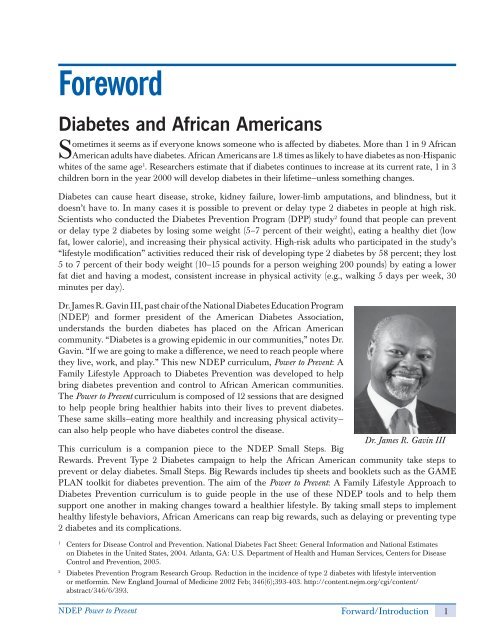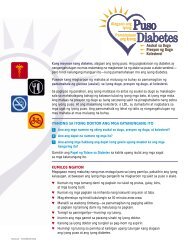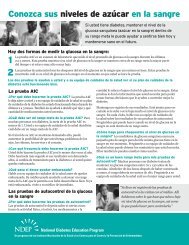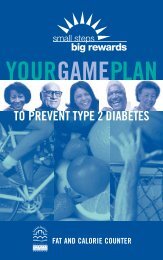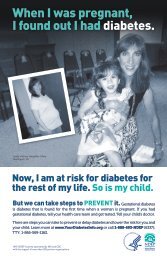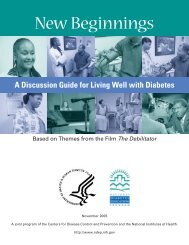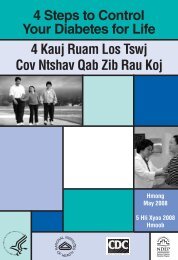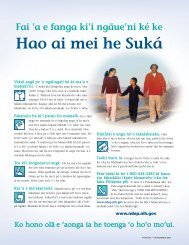Power to Prevent - National Diabetes Education Program - National ...
Power to Prevent - National Diabetes Education Program - National ...
Power to Prevent - National Diabetes Education Program - National ...
Create successful ePaper yourself
Turn your PDF publications into a flip-book with our unique Google optimized e-Paper software.
Foreword<br />
<strong>Diabetes</strong> and African Americans<br />
Sometimes it seems as if everyone knows someone who is affected by diabetes. More than in 9 African<br />
American adults have diabetes. African Americans are .8 times as likely <strong>to</strong> have diabetes as non-Hispanic<br />
whites of the same age . Researchers estimate that if diabetes continues <strong>to</strong> increase at its current rate, in 3<br />
children born in the year 2000 will develop diabetes in their lifetime—unless something changes.<br />
<strong>Diabetes</strong> can cause heart disease, stroke, kidney failure, lower-limb amputations, and blindness, but it<br />
doesn’t have <strong>to</strong>. In many cases it is possible <strong>to</strong> prevent or delay type 2 diabetes in people at high risk.<br />
Scientists who conducted the <strong>Diabetes</strong> <strong>Prevent</strong>ion <strong>Program</strong> (DPP) study 2 found that people can prevent<br />
or delay type 2 diabetes by losing some weight (5–7 percent of their weight), eating a healthy diet (low<br />
fat, lower calorie), and increasing their physical activity. High-risk adults who participated in the study’s<br />
“lifestyle modifcation” activities reduced their risk of developing type 2 diabetes by 58 percent; they lost<br />
5 <strong>to</strong> 7 percent of their body weight ( 0– 5 pounds for a person weighing 200 pounds) by eating a lower<br />
fat diet and having a modest, consistent increase in physical activity (e.g., walking 5 days per week, 30<br />
minutes per day).<br />
Dr. James R. Gavin III, past chair of the <strong>National</strong> <strong>Diabetes</strong> <strong>Education</strong> <strong>Program</strong><br />
(NDEP) and former president of the American <strong>Diabetes</strong> Association,<br />
understands the burden diabetes has placed on the African American<br />
community. “<strong>Diabetes</strong> is a growing epidemic in our communities,” notes Dr.<br />
Gavin. “If we are going <strong>to</strong> make a difference, we need <strong>to</strong> reach people where<br />
they live, work, and play.” This new NDEP curriculum, <strong>Power</strong> <strong>to</strong> <strong>Prevent</strong>: A<br />
Family Lifestyle Approach <strong>to</strong> <strong>Diabetes</strong> <strong>Prevent</strong>ion was developed <strong>to</strong> help<br />
bring diabetes prevention and control <strong>to</strong> African American communities.<br />
The <strong>Power</strong> <strong>to</strong> <strong>Prevent</strong> curriculum is composed of 2 sessions that are designed<br />
<strong>to</strong> help people bring healthier habits in<strong>to</strong> their lives <strong>to</strong> prevent diabetes.<br />
These same skills—eating more healthily and increasing physical activity—<br />
can also help people who have diabetes control the disease.<br />
This curriculum is a companion piece <strong>to</strong> the NDEP Small Steps. Big<br />
Rewards. <strong>Prevent</strong> Type 2 <strong>Diabetes</strong> campaign <strong>to</strong> help the African American community take steps <strong>to</strong><br />
prevent or delay diabetes. Small Steps. Big Rewards includes tip sheets and booklets such as the GAME<br />
PLAN <strong>to</strong>olkit for diabetes prevention. The aim of the <strong>Power</strong> <strong>to</strong> <strong>Prevent</strong>: A Family Lifestyle Approach <strong>to</strong><br />
<strong>Diabetes</strong> <strong>Prevent</strong>ion curriculum is <strong>to</strong> guide people in the use of these NDEP <strong>to</strong>ols and <strong>to</strong> help them<br />
support one another in making changes <strong>to</strong>ward a healthier lifestyle. By taking small steps <strong>to</strong> implement<br />
healthy lifestyle behaviors, African Americans can reap big rewards, such as delaying or preventing type<br />
2 diabetes and its complications.<br />
2<br />
Dr. James R. Gavin III<br />
Centers for Disease Control and <strong>Prevent</strong>ion. <strong>National</strong> <strong>Diabetes</strong> Fact Sheet: General Information and <strong>National</strong> Estimates<br />
on <strong>Diabetes</strong> in the United States, 2004. Atlanta, GA: U.S. Department of Health and Human Services, Centers for Disease<br />
Control and <strong>Prevent</strong>ion, 2005.<br />
<strong>Diabetes</strong> <strong>Prevent</strong>ion <strong>Program</strong> Research Group. Reduction in the incidence of type 2 diabetes with lifestyle intervention<br />
or metformin. New England Journal of Medicine 2002 Feb; 346(6);393-403. http://content.nejm.org/cgi/content/<br />
abstract/346/6/393.<br />
NDEP <strong>Power</strong> <strong>to</strong> <strong>Prevent</strong> Forward/Introduction


